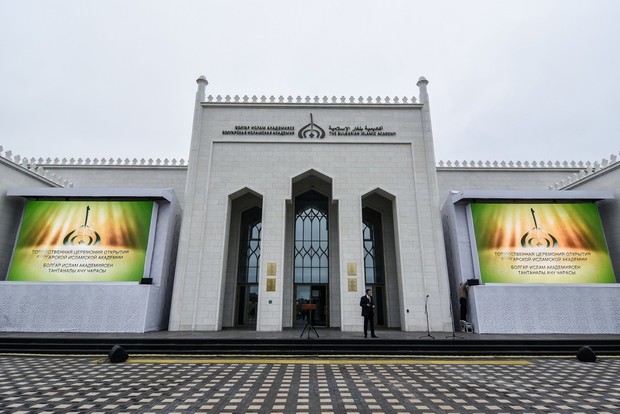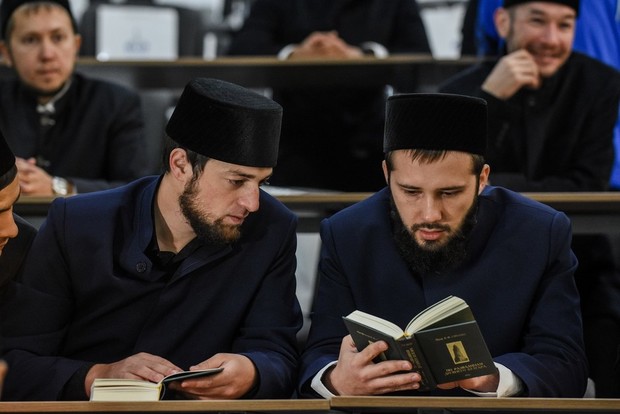''Even if you study Persian poetry, you will be anyway asked how to cope with Islamic radicals''
Islam between religious politics and science
Realnoe Vremya's columnist Alfrid Bustanov continues his cycle of articles about the Tatar manuscript and peculiarities of its life in society, terminology. Today the expert in Eastern studies differentiates Islamists and experts in Islamic studies.
Difference between mullah and expert in Islam
In our country, we can observe quite an interesting phenomenon of close neighbourhood of the humanities and experts who are influenced by religious organisations and reflect their interests. A false impression of interchangeability of these spheres is created due to such a merger: like Islamic studies and apologetics of Islam are the same thing and vice versa. And it seems that there is not a big difference between a mullah and an expert in Islamic studies. It is a problem because the researcher, anyway, should aspire to be above the ''fight'' and associate himself with neither apologetics of different movements of Islam nor its virulent critics nor holding power.
On the one hand, it is our achievement: only Russia has almost had a class of Islamic intelligentsia – highly educated Muslims with scientific degrees who consider Islam not only as a subject of interest but also as part of the personal and public life. For instance, there is a handful of Muslims at universities in the Netherlands. This is why we can boast about the big openness in this respect.
On the other hand, frames of the scientific discipline that is designed to critically consider history and modernity of the Islamic work obviously are blurring. As the situation with critical science and expertise in our country is not fine, we should protect Islamic studies as an academic discipline that useful for the society, in general.

''Today we are facing a similar initiative in the form of the Bolgarian Islamic Academy that has a task to bring ''Islamic theologians'' up in Russia and not let the young go abroad.'' Photo: Oleg Tikhonov
How missionaries founded classical Islamic studies
Yes, very academic Islamic studies come from missionary and polemical Christian literature. Islamic texts were examined in the Middle Ages, first of all, to renounce and prove the falseness of ''Mohamed's religion''. At the same time, philological approaches, knowledge of language and contexts of its usage were the basis of studying Islam. Although our country did not have independent Islamic studies with its own subject and tools, in fact, especially during the Soviet years, because strict academic philological approaches were common to classic experts in Eastern studies: one can open collections of articles of Sinologists, experts in Buddhist and Arab studies of the 70s, and there won't be a big diversity of delivery of materials there.
I think that the division that exists in modern Germany in academic Islamic studies (Islamwissenschaft) and Islamic theology (Islamische Studien) is useful. But our situation is by far complicated. If in Germany Islamic studies today are inevitably linked with the presence of migrants in Europe, in Russia, Islam is, first of all, just a limited part of Russian culture. What is more, there was an attempt to create a state school for Islamic religious activists in the Soviet Union after the war – Mir-Arab madrasah in Bokhara and Islamic Institute in Tashkent. Today we are facing a similar initiative in the form of the Bolgarian Islamic Academy that has a task to bring ''Islamic theologians'' up in Russia and not let the young go abroad. Even if nobody has ever thought about sending Soviet experts in Eastern studies to teach in Bokhara, achievements of Soviet science directly affected the fate of Islam in Russia. It is enough to mention the couple from Baranov's Arabic dictionary and Quran's translation into the Russian language ''by Krachkovsky''. It seems that all the mosques and madrasahs of our country have this couple.
In addition, the prestige of academic Islamic studies and its symbolic capital attract from Muslims. It is interesting that the roots of this interest lie in the late Soviet era when education in the Faculty of Eastern Studies was almost the only legal possibility to learn the Arabic language well and learn how to read Islamic texts. Nowadays Islamic studies are a resource to legitimise religious activists in the secular space where it would be good to have a scientific degree and association with the scientific Islamic topic as it used to be in the USSR. Nevertheless, the further we went, the more the ''cult'' of Islamic studies changed with its criticism and exposure thanks to the availability of very religious education. One can often hear that experts in Islamic studies are guilty of demonisation of Islam or that they serve the country to provide supervision and violation of Muslims. It is a big topic. And I offer to talk about it next time. But here and now it is important to establish that Islamic studies are simultaneously a red rag and desired status for Muslims.

''Islamic studies as science are a very abstract concept. Despite my colleagues' attempt to close this area of knowledge in an ivory tower and accuse those who try to get a high title of expert in Islamic studies ''not by right'' of blasphemy, this science includes almost an endless set of disciplines and topics that are not limited by specialised education.'' Photo: Oleg Tikhonov
Why the most obscurantist characters suddenly turn out to be ''famous experts in Islamic studies''
Islamic studies as science are a very abstract concept. Despite my colleagues' attempt to close this area of knowledge in an ivory tower and accuse those who try to get a high title of expert in Islamic studies ''not by right'' of blasphemy, this science includes almost an endless set of disciplines and topics that are not limited by specialised education, studied region and genre of publications. Today anybody can turn out an expert in Islamic studies, somebody says something about Islam in public. And, unfortunately, in public, the most obscurantist characters suddenly turn out to be ''famous experts in Islamic studies''. Such difficulties are linked with the sharp polarisation of Islam in the world, in general, and the post-Soviet space, in particular. Even if you calmly study Persian poetry in Mawarannahr, you will be anyway called and asked how to cope with Islamic radicals.
Finally, about politics. Religious politics uses both very theological Islamic studies and secular Islamic studies for its purposes. In addition, when it comes to political games, an ordinary person can be easily confused: a politician who has experience in this business can consider he has the right to speak about the benefit and harm of Islamic studies, define its subject field and either protect its or ruthlessly criticise having affiliation to neither religion nor science. ''Truth'' and ''lie'' don't matter here, achievement of the political goal is the most important thing.
Such political games play into hands of neither Muslim nor scientists, of course, because they discredit both. A critical view and deconstruction are the only means to fight against such tendencies. Therefore, there are scientists to study and call a spade a spade.